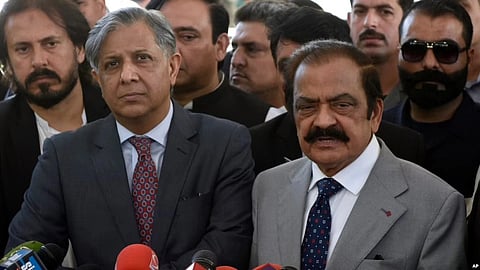ISLAMABAD — Pakistan's Supreme Court ordered Tuesday that snap elections in two provinces must be held on May 14, declaring that a delay of the votes by a government-backed election commission was unlawful.
The verdict handed a political victory to former Prime Minister Imran Khan, who has been pushing for early national elections since he was ousted from power by a parliamentary no-confidence vote a year ago.
Khan's Pakistan Tehreek-e-Insaf political party, or PTI, controlled the legislatures and governments in central Punjab and northwestern Khyber Pakhtunkhwa provinces until January, when he dissolved them to force early nationwide polls.
His successor, Prime Minister Shehbaz Sharif, rejected his call for new elections and backed the election panel's delay, saying it was impossible to organize the votes while the country suffered from an economic crisis and growing terrorist attacks.
"The impugned order … made by the Election Commission of Pakistan is declared to be unconstitutional, without lawful authority or jurisdiction … and is hereby quashed," the three-member bench led by the chief justice ruled Tuesday. It set May 14 as the new date for polls in Punjab to make up for the time lost.
"Neither the constitution nor the law empowers the commission to extend the date of elections beyond the 90 days," read the ruling.
Pakistan's constitution binds the commission to schedule elections within 90 days of the dissolution of national or provincial legislatures. But it moved the Punjab polls from April 30 to October 8, when national elections are scheduled in Pakistan, saying the government had refused to provide funding and security.
The top court ruled that the Sharif government must unlock funds for the polls and ensure the security of the democratic process.
The panel also allowed for a separate petition to be moved to determine the date of Khyber Pakhtunkhwa's polls to meet the constitutional requirement.
Senior PTI leaders speaking to reporters outside the court declared the verdict a "victory for the rule of law.”
Pakistani Law Minister Azam Nazeer Tarar criticized the ruling, warning it would "deepen the ongoing political and constitutional crisis" in the country.
"I can only express sorrows and regret over the decision," he told reporters in Islamabad.
Pakistan's political turmoil comes amid a deepening economic crisis in the country of about 232 million people. The nuclear-armed South Asian nation's foreign exchange reserves have dropped to barely enough for four weeks of imports, with official consumer price inflation jumping to more than 35%, the highest in decades.
Khan, 70, maintains that Pakistan's economic crisis can only be resolved once political stability is in place through free and fair elections. He insists the Sharif government is shying away from elections, fearing PTI's growing popularity.
In recent weeks, the cricket-star-turned-deposed leader has accused authorities of arresting thousands of his party workers, including his social media operators, and subjecting them to custodial torture.
Police have confirmed fewer than 1,000 arrests were made after PTI workers' recent violent clashes with security forces.
The government has called Khan's party a "gang of miscreants" but has not responded to his assertions about the police crackdown on his supporters.
"We will not rest until we salvage the country from a nuisance and rioter like you," Information Minister Marriyum Aurangzeb said in response to Khan's allegation of torture against his party activists.
Political tensions in Pakistan have worsened since last November when Khan was wounded in the leg when gunfire hit his vehicle during an anti-government march. He accused Sharif and several administration members of the assassination attempt. The government rejected the charges as frivolous. [VOA/NS]


